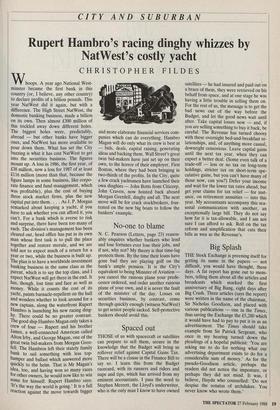CITY AND SUBURBAN
Rupert Hambro's racing dinghy whizzes by NatWest's costly yacht
CHRISTOPHER FILDES
Whoops. A year ago National West- minster became the first bank in this country (or, I believe, any other country) to declare profits of a billion pounds. This year NatWest did it again, but with a difference. The High Street NatWest, the domestic banking business, made a billion on its own. Then almost £300 million of this trickled away down different holes. The biggest holes were, predictably, abroad — but other banks have bigger ones, and NatWest has more available to pour down them. What has set the City buzzing is what it has cost NatWest to get into the securities business. The figures mount up. A loss in 1986, the first year, of £38 million, now a loss for 1987 of at least £116 million (more than that, because the figure lumps in some business, like corpo- rate finance and fund management, which was profitable), plus the cost of buying three stock market firms, plus the new capital put into them. . . . As J. P. Morgan remarked about keeping a yacht, if you have to ask whether you can afford it, you can't. For a bank which is averse to risk and surprise, there have been too many of each. The division's management has been cleared out, head office has put in its own man whose first task is to pull the place together and restore morale, and we are told not to expect much of a return for a year or two, while the business is built up. The plan is to have a worldwide investment banking business in the same class as the parent, which is to say the top class, and I expect NatWest will get there in the end. It has, though, lost time and face as well as money. While it counts the cost of its yacht, paints barnacle-repellent on the hull and wonders whether to look around for a new captain, along the waterfront Rupert Hambro is launching his new racing ding- hy. There could be no greater contrast. The good ship Hambro Magan only takes a crew of four — Rupert and his brother James, a well-connected American called Alton Irby, and George Magan, one of the great twin bid-makers from Morgan Gren- fell. The Hambros left their stately family bank to sail something with less top- hamper and ballast which answered more quickly to the helm. That is Mr Magan's idea, too, and having won so many races for other owners, he would now like to win some for himself. Rupert Hambro says: `It's the way the world is going.' It is a full reaction against the move towards bigger and more elaborate financial services com- panies which can do everything. Hambro Magan will do only what its crew is best at — bids, deals, capital raising, generating ideas and backing them. Wall Street's great twin bid-makers have just set up on their own, to the horror of their employer, First Boston, where they had been bringing in two-thirds of the profits. In the City, quite a few crack yachtsmen have launched their own dinghies — John Botts from Citicorp, John Craven, now hoisted back aboard Morgan Grenfell, dinghy and all. The next move will be for crack stockbrokers, frus- trated on the new big boats to follow the bankers' example.


















































 Previous page
Previous page